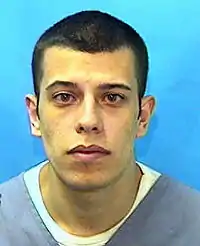Ryan Holle
Ryan Joseph Holle (born November 17, 1982) was convicted in 2004 of first-degree murder under the felony murder rule for lending his car to a friend after the friend and others at a party discussed their plans to steal drugs and money and beat up the 18-year-old daughter of Christine Snyder.[2][3][4] A former resident of Pensacola, Florida, United States, he is now serving a sentence of 25 years at the Graceville Correctional Facility after his life without the possibility of parole sentence was commuted by Governor Rick Scott.[2]
Ryan Holle | |
|---|---|
 | |
| Born | November 17, 1982[1] |
| Criminal status | Incarcerated at Graceville Correctional Facility |
| Conviction(s) | first degree murder, armed burglary, armed robbery[1] |
| Criminal penalty | Life imprisonment (commuted to 25 years imprisonment) |
Details of murder
On the early morning of March 10, 2003, after a night of partying, Holle lent his car to a friend and housemate,[2] William Allen, Jr.[5] Allen used the car to drop three men off at the house of Christine Snyder, where they removed a safe containing 1 pound (450 g) of marijuana and US$425.[5] During the burglary, one of the men, Charles Miller, Jr., used a shotgun he had found in the house to bludgeon Jessica Snyder to death.[2][5] Holle was 1 1⁄2 miles (2 km) away.[2]
Convictions
Prosecutors sought the death penalty for Charles Miller, Jr., who confessed to the killing; but he was sentenced to life without parole on May 12, 2005.[4] The two men who entered the Snyders' home with him each received the same sentence, as did the driver, William Allen, Jr.[2]
Christine Snyder was sentenced to three years in prison for marijuana possession.[2]
Application of felony murder rule
Holle, who had given the police statements in which he seemed to admit knowing about the burglary, was convicted on August 3, 2004,[3] of first-degree murder under a legal doctrine known as the felony murder rule. The doctrine broadens murder liability for participants in violent felonies to include a killing by an accomplice. As the prosecutor David Rimmer explained: "No car, no murder." The victim's father, Terry Snyder, concurred: "It never would have happened unless Ryan Holle had lent the car. It was as good as if he was there."[2]
Statements in defense
Allen said in a pretrial deposition that all Holle did "was to say, 'Use the car.' I mean, nobody really knew that girl was going to get killed. It was not in the plans to go kill somebody, you know." Holle had no criminal record. He had lent his car to Allen countless times before. In a 2007 interview with The New York Times, Holle stated that "I honestly thought they were going to get food," adding that "When they actually mentioned what was going on, I thought it was a joke." He added that he was naive, and had been drinking all night, so he "didn't understand what was going on."[2]
Trial
Holle was the only involved person to be offered a plea bargain that might have led to a sentence of only 10 years, but he refused the deal. Holle's trial lasted one day, including testimony, jury deliberations, conviction, and sentencing.[2] On June 24, 2015, Holle's sentence was reduced by Governor Rick Scott to 25 years in prison and 10 years of probation.[6] Holle's projected release date is June 30, 2024.[1]
See also
References
- "Inmate Population Information Detail - Ryan Holle". Florida Department of Corrections. Retrieved February 7, 2010.
- Liptak, Adam (2007-12-04). "Serving Life for Providing Car to Killers". The New York Times.
- "Pensacola Man Convicted in Teen's Drug-Theft Murder". Associated Press. 2004-08-04.
Holle allowed his four co-defendants to borrow his car after they talked about stealing a safe from Snyder's home and beating her.
- "Fifth suspect sentenced to life in prison without parole in Pensacola teen's killing". St. Augustine Record. 2005-05-14. Retrieved 2007-12-09.
- "Around the state: 2 convicted of murdering teen". St. Petersburg Times / wire services. 2004-06-11. Retrieved 2007-12-08.
- "Governor and Cabinet cut prison sentences for two in rare clemency action".